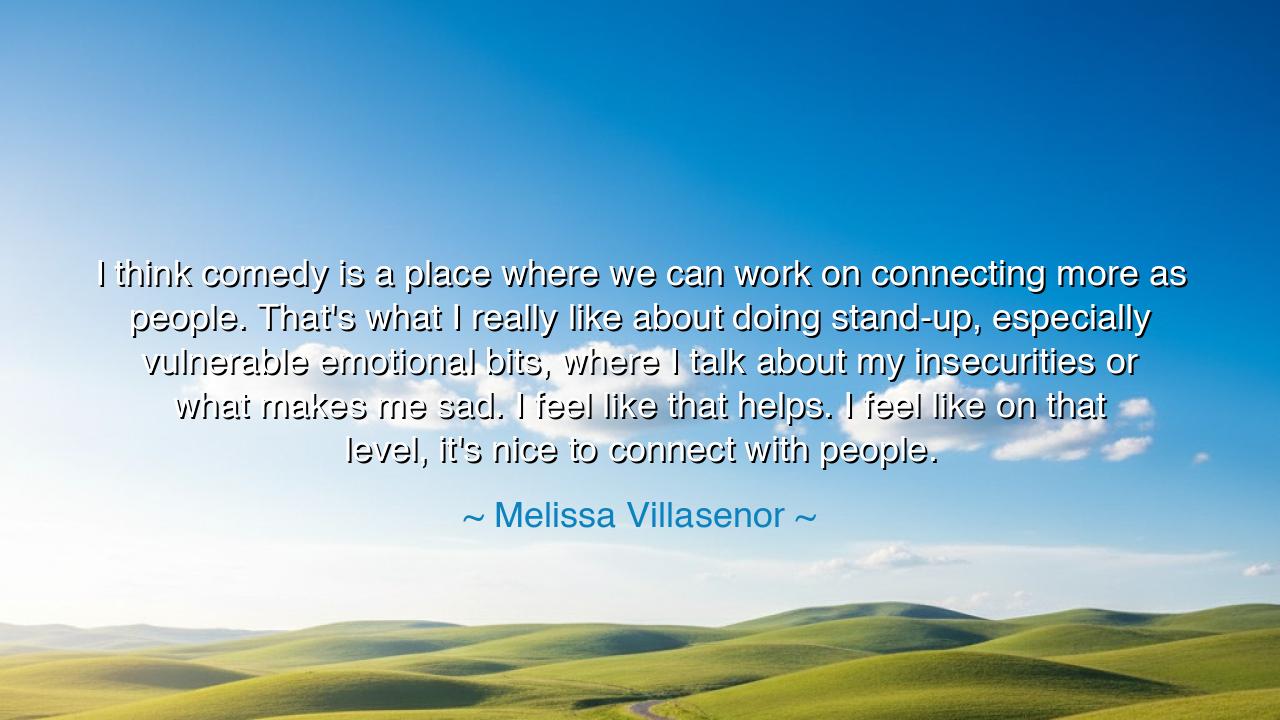
I think comedy is a place where we can work on connecting more as
I think comedy is a place where we can work on connecting more as people. That's what I really like about doing stand-up, especially vulnerable emotional bits, where I talk about my insecurities or what makes me sad. I feel like that helps. I feel like on that level, it's nice to connect with people.






When Melissa Villaseñor said, “I think comedy is a place where we can work on connecting more as people. That’s what I really like about doing stand-up, especially vulnerable emotional bits, where I talk about my insecurities or what makes me sad. I feel like that helps. I feel like on that level, it’s nice to connect with people,” she spoke not merely as a comedian, but as a philosopher of the heart. Her words unveil a truth that echoes through the ages — that laughter is sacred, a bridge between wounded souls, and that vulnerability, not perfection, is what unites humanity. Behind her gentle humor lies a wisdom that even the ancients would have recognized: that laughter, when born from truth, is an act of healing.
Comedy, in its deepest form, is not the art of mocking or entertaining alone — it is the mirror of the human condition. It reveals our fears, our foolishness, our longing for love and acceptance. In speaking of her insecurities and sadness, Villaseñor honors this ancient tradition, reminding us that the most profound laughter often springs from pain. The Greeks knew this too. Their comedies, like those of Aristophanes, were not mindless diversions but reflections of society’s anxieties and hypocrisies. Through laughter, they purified emotion, turning shame into recognition, and despair into solidarity. So it is with Villaseñor: in confessing her sadness, she allows others to feel less alone.
This truth — that vulnerability creates connection — is one that humanity often forgets. The strong hide their tears, the proud conceal their doubts, and the lonely wear masks of confidence. Yet it is only when the mask falls that hearts begin to recognize each other. Villaseñor’s stage becomes a temple of shared humanity, where laughter replaces judgment, and the audience, for a fleeting moment, becomes a family of souls who understand. Her art proves that to make others laugh sincerely, one must first have the courage to reveal one’s own truth.
Consider the story of Charlie Chaplin, another artist who transformed sorrow into laughter. Born into poverty, abandoned by his father, and scarred by hardship, he used humor not to escape his pain but to transform it. His “Little Tramp” — poor, clumsy, yet endlessly hopeful — became the voice of every struggling human being. Chaplin, like Villaseñor, showed that comedy, when sincere, is not frivolous but divine. It reminds us that even in suffering, there is light; even in sadness, there is connection. Both artists, separated by a century, understood that laughter is empathy made audible.
Villaseñor’s insight also carries a moral challenge. In an age where much of comedy seeks division or cruelty — where laughter is often weaponized to mock the weak — she calls us back to its true purpose: to heal, not to harm. The ancients would have honored such wisdom. The Stoic philosophers, who prized emotional clarity and human kinship, might have said that true laughter aligns with virtue when it uplifts the soul rather than diminishes another. Thus, the highest comedy is not built upon ridicule, but upon shared recognition — the moment when we see ourselves in each other’s imperfections and, through laughter, forgive them.
There is also profound spiritual courage in her words. To speak of one’s insecurities publicly is to disarm the ego; to turn sadness into laughter is to transform pain into power. This is the alchemy of the artist — to take what is fragile and make it beautiful, to turn tears into gold. In this way, Villaseñor’s comedy is not entertainment but medicine — gentle, honest, and necessary. She reminds us that joy and sorrow are not opposites, but partners in the dance of being human.
The lesson is timeless: dare to be open, dare to laugh at your pain, and you will find others who have walked the same road. Laughter does not erase suffering, but it softens it; it binds hearts across the boundaries of fear. Whether on stage or in daily life, when we share our vulnerability, we give others permission to be real. And in that shared honesty, connection blooms like light in the dark.
So, O seeker of understanding, remember Villaseñor’s gentle wisdom: do not hide behind strength, for it isolates the heart. Speak your truth — your sadness, your awkwardness, your fears — and smile through it. In that moment, you become a healer, a bridge between souls. For in laughter born of truth, as she reminds us, there is something divine — the rediscovery that we are all, beneath our pain, joy waiting to be shared.






AAdministratorAdministrator
Welcome, honored guests. Please leave a comment, we will respond soon